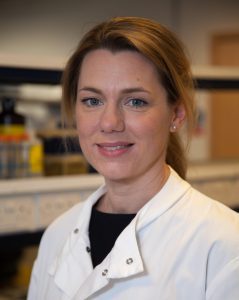 Professor Sarah McClelland
Professor Sarah McClelland
Barts Cancer Institute
Awarded: £50,000 – in partnership with GIST Cancer UK
The challenge
When cancer cells divide, they can lose or rearrange genetic material. This means that cellular processes are not controlled as they should be. This happens through a process called chromosome instability. GIST, which make up 20% of all sarcomas, has a particularly high amount of chromosomal instability, but we don’t know why this occurs.
How will this project tackle this challenge?
The project team, led by Prof Sarah McClelland, aims to identify the ‘Achilles heel’ associated with chromosomal instability. This will help researchers design new therapies that work better in cancer cells.
To do this they first need to understand the pathways that make this happen. They will use advanced technology to look at the DNA of individual cells and detect small changes that occur during the growth of a cell into a population of cells. They have already tested this method in different cancer types and will now apply it to GIST for the first time. They will also explore why some cell processes in GIST don’t work as they should.
What this means for people affected by sarcoma
This research will provide key answers as to how and why GISTs change their genomes. This is hugely important for this team and for other sarcoma scientists. It could help patients get the right subtype diagnosis, and feed into other research targeting the changes the team are exploring in this project. This could be through developing new ‘markers’ of prognosis and how well treatments are working, or to better or more tailored treatment options.









